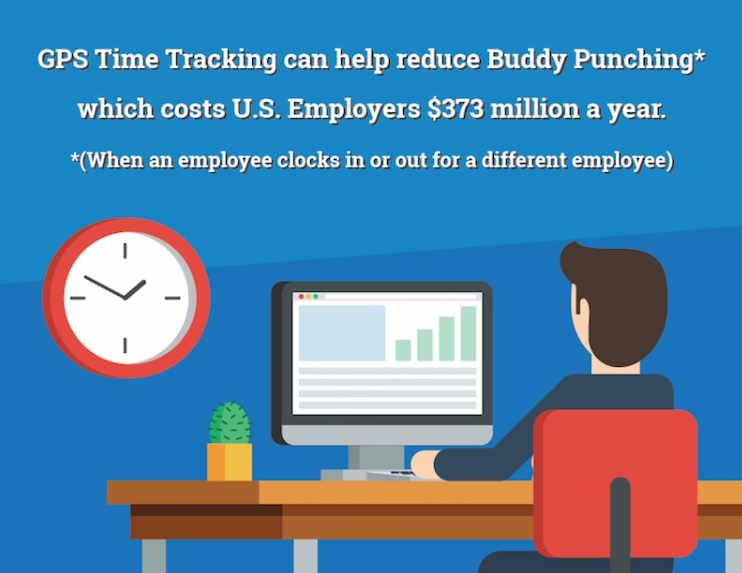
Finding ways to deal with payroll issues can be difficult. Whether you are looking at paid time off policies or overtime pay, you’re dealing with some of the issues that can have the largest financial impact on your company. For most companies, though, the best place to start is with keeping track of employee hours. While the old time-clock is a tried and true solution for many, it’s not the only choice around. Thanks to the prevalence of smart devices, it’s possible to start looking at GPS time tracking for employees. This new solution can make a huge difference for some businesses – and like most things, it can come with both positive and negative impacts.
If you’re starting to seriously think about GPS time tracking, it’s a good idea to look at some of the pros and cons of these apps. As with most types of technology, you’re not looking at a simple ‘good vs. bad’ scenario – you’re looking at costs that you’ll have to weigh. The pros can be incredibly strong for one business, but the cons might outweigh them seriously for another. Below are just a few of the pros and cons of using this type of system.

When you decide to use employee time tracking apps, you’ll notice that some of your old time-tracking tools are suddenly obsolete. Say goodbye to your time clock and your processing rooms – that’s space you can now reclaim for your business. In fact, you can do away with quite a bit of your time-keeping infrastructure now that you’re moving all of the technology onto smartphones. It can be a disorienting transition to make in some circumstances, but it’s also one that will pay off.
This also means that you won’t have to keep investing in this type of infrastructure when you build new sites. While a time-clock or a login computer might not be the biggest cost your business has to bear, it is still a cost. If you’re looking for areas to cut in your budget, it might be nice to get rid of this single line item. The savings may not be titanic, but they’ll add up as your business continues to grow and you continue to add more locations and more employees to your roster.
Click here to learn about the benefits of managing your payroll online.
Technical support problems are par for the course when using any kind of technology. Luckily, your business already employs individuals who are experienced in working with your company’s systems and know what to do when something goes wrong. Unfortunately, making use of a time tracking app makes things exponentially more difficult because you’re suddenly requiring your IT team to know how to deal with bugs and problems across potentially dozens of different platforms. Unless you require your employees to have a very specific device for logging into the system, you’ll have to make sure that your tech support team can troubleshoot almost any phone that’s on the market.
These are just the hardware problems, though – there are also major difficulties that can occur when the apps themselves have problems. A problematic phone update can cause your GPS login system to fail to work properly, and you’ll have to find ways to deal with that for various employees. The worst-case scenario is that you’ll deal with cascading failures as various operating systems update, leaving your IT team scrambling to fix problems as they become apparent – only to have to double back as soon as the next round of updates begin.

Flexibility is one of the best features of this type of time tracking. You no longer have to require your employees to come to a single site to start their days. There’s no more lining up at the time clock or dealing with minor adjustments to the schedule because one person had problems with a passcode. Every employee can log in from his or her proper location and begin the workday without delay. This can not only save you a great deal of frustration, but it can also help you to save quite a bit of paid time over the course of a year.
In addition to saving time, it can also save your remote employees quite a few headaches. Imagine allowing your employees who have to drive to remote sites the ability to clock in as soon as they arrive instead of requiring them to double back to home base to punch in – a process that saves everyone a great deal of time and energy. You also get the satisfaction of knowing exactly when an employee at a remote site stopped and started working without having to take his or her word on the fact. Again, this is something that can save many erroneously billed hours.

Unfortunately, there’s no such thing as a perfect login structure. No matter what way you choose to monitor your employees’ time, there will be room for mistakes and for abuse. The wide variety of possible time tracking apps and the relative freedom employees have to adjust them at their leisure does make these apps feel a bit risky. While most employees don’t have either the desire or technical skill to find a workaround for these apps, it’d be naive to think that they aren’t out there and accessible for those who want them.
Much of the abuse that can occur with the apps will happen without any malice. Apps might not update correctly after a time zone change or after daylight savings time kicks in. The app might lose a step because of bad wifi or because an employee lost his or her phone. The problems caused by the app might be easy to fix, but this only happens if the problems are caught in time. Until such time as bugs and workarounds are identified, your company can find itself losing money on time tracking apps and software.

There are definitely pros and cons to using time tracking GPS software for your employees. Whether or not these apps are a good fit for your business depends both on how you feel about these factors and how your business currently operates. If you’re looking for ways to help keep track of your payroll more efficiently, it can pay to work with professionals. If you’re ready to make the right decisions for your business’ payroll and HR matters, don’t try to go it alone – take some time to look at Paytech’s Ask Sally and find the solution that works best for you.